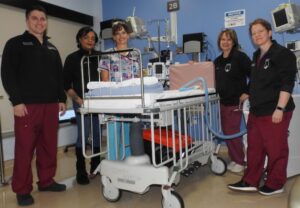
By Bernard S. Little
WRNMMC Command Communications
“Children are not merely ‘little adults.’ There are unique physiological and maturational changes that occur with age. There is also no one-size-fits-all approach to medications for children. Children are constantly growing, and so their medication doses are given based on their bodyweight and repeated as needed to achieve the desired effect in the safest manner.”
Army Col. (Dr.) Jennifer Kicker, medical director of the Pediatric Intensive Care Unit and Pediatric Sedation Services at Walter Reed, shared that professional knowledge in explaining the mission of the Pediatric Sedation Unit (PSU).
“The PSU at Walter Reed performs 300 to 400 sedated procedures each year on children of varying developmental stages and ages, from 60 weeks post-conceptual to 23 years of age,” Kicker said. “Although predominantly an outpatient elective service, the PSU also supports time-sensitive sedated procedures for inpatient pediatric patients.”
She explained pediatric sedation encompasses “a multidisciplinary team approach used to reduce anxiety, pain or excessive patient movement that may interfere with medically necessary treatments or radiology studies. Children often cannot understand the need for medical interventions and may respond with apprehension or develop a heightened fear response to subsequent encounters with the medical team.”
Kicker said that while sedation often involves medications, the PSU at Walter Reed also incorporates elements of child life and medical play, age-appropriate distraction, and parent participation in order to craft a successful [sedation] experience.
Referrals to the PSU come from the primary care managers of patients, or subspecialty providers who order tests or studies that could be more comfortably be done with some degree of sedation or pain relief, Kicker said. “We tailor the depth of sedation needed – minimal, moderate, or deep – based on the characteristics of the study ordered and on the child’s abilities to cooperate with the care team,” she added.
“We frequently assist with lab draws and immunization administration for children and young adults with developmental or behavioral challenges,” said Kicker. “We support imaging studies in MRI, CT, fluoroscopy and nuclear medicine. We also provide sedation for lumbar punctures (spinal taps), bone marrow biopsies, hearing tests, dilated eye exams and minor procedures on the eyelids, and minor dermatology procedures.”
The unit, located in the main inpatient hospital, is run by pediatric critical care physicians and includes five board-certified pediatric intensivists, a certified physician assistant, a registered nurse with pediatric-specific procedural sedation experience, and a pediatric sedation scheduler.
“To stay on the forefront of the rapidly progressing field of pediatric sedation, our team members participate in continuing education at the local level as well as nationally through offerings from the professional society in our field, the Society of Pediatric Sedation,” Kicker said.
She added pediatric critical care physicians complete three additional years of training after finishing their three-year pediatric residency in order to develop mastery in intensive care unit care and procedural sedation.
“Our physician assistant served a significant portion of her career in the Pediatric Intensive Care Unit before transitioning to the PSU four years ago. And our registered nurse has a wealth of experience as an inpatient pediatric nurse prior to her current assignment with the PSU.”
Kicker added the PSU team has an especially close relationship with Pediatric Oncology Service at Walter Reed, where the PSU supports the recurring procedural sedation needs of children with cancer throughout their treatment, which can last three or more years.
“Through the strength of our intra/interdepartmental relationships at Walter Reed, we can meet the procedural sedation needs of kids here where their specialty teams reside, instead of relying on the network of children’s hospitals in the area,” Kicker added.
“We’re especially proud of our nitrous oxide (laughing gas) service,” Kicker shared. “Despite the challenges at the height of the pandemic, nitrous oxide was a new addition to our service line in the summer of 2020. Our first nitrous oxide patient was a teenager with autism. I remember his father was skeptical that nitrous oxide in conjunction with other medications could lead to the successful outcome we all aspired to that was comfortable and tolerable for his son. At the conclusion of the procedure, this dad as moved to tears and hugged the team. His son’s experience in PSU was so much better than prior attempts at the same. Nitrous oxide and our understanding medical team made all the difference,” she added.